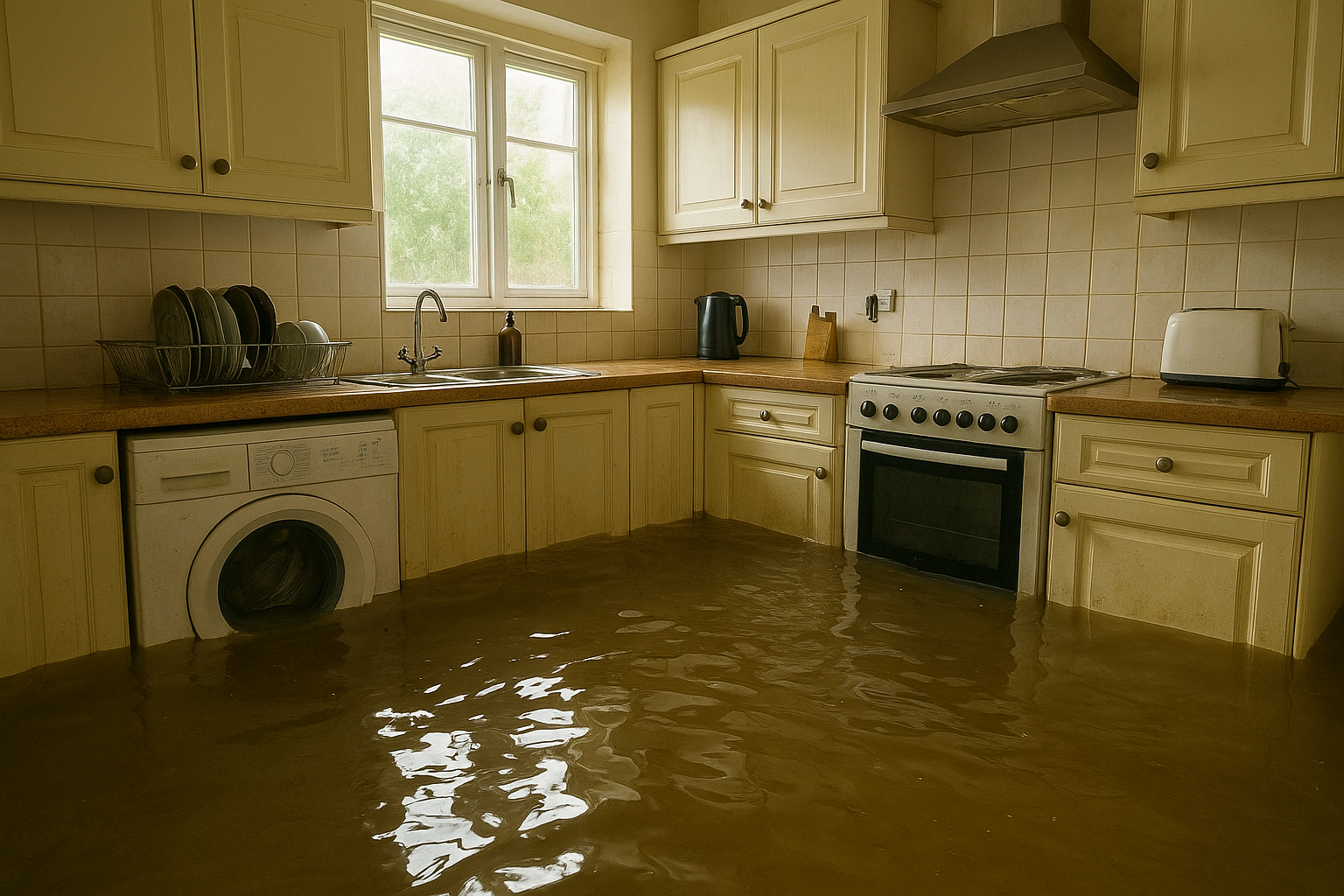


You might be surprised to learn that a water damage insurance claim makes up one in four household insurance claims in the UK.
British insurers paid out £573 million in weather-related home insurance claims during 2023. Half of this amount – £286 million – came from flood damage after storms. Water leaks create significant headaches, accounting for approximately 30% of all home claims. Insurance companies pay roughly £1.8 million each day to fix this type of damage.
Many homeowners get shocked by repair quotes of around £10,000 after filing water leak damage claims. Insurance companies don’t always tell you they handle building work and repairs differently. You might need to talk things through with loss adjusters to get a fair deal.
Small leaks can turn into big problems, so you need to know how a water damage insurance claim works. This piece offers expert tips to help you handle your claim and get the money you deserve. We’ll show you everything from collecting evidence to dealing with loss adjusters – including some strategies insurance companies wish you didn’t know about.
Quick action can save your property during a water damage emergency. Time matters when you face flooding or leaks. The right immediate response will reduce damage substantially and help build a stronger insurance claim.
You should locate the water source and shut off the main supply right away. This quick action stops more flooding. The electricity must be turned off if water spreads widely to prevent electrical hazards.
Here are the key steps to take:
Your insurance claim could suffer if you start restoration work before your insurer or their loss adjuster evaluates the situation.
Insurance companies expect you to take reasonable steps to minimise damage. Your claim settlement could be affected if you fail to act. A loss adjuster might visit within 24 hours to assess damage and arrange alternative accommodation for severe cases.
Detailed records of all damage and communications with your insurer are the foundations of a successful water damage insurance claim. Keep everything documented carefully.
Good documentation is the foundation of a successful water damage insurance claim. After stopping the leak, you should start documenting everything that happened.
Take photos of the leak’s source and all affected areas. You need clear images from different angles that show walls, ceilings, floors and damaged belongings. These photos will be vital evidence for your insurance claim and help get a full picture of the damage. Use tape or a marker pen to show how high the water reached on your walls.
Make a complete list of everything that’s damaged, with each item’s estimated value and age. This detailed inventory will back up your contents insurance claim and help you get fair compensation.
Get reports from plumbers or leak detection experts since these documents will strengthen your claim. Make sure to keep these reports with your notes about what happened.
Keep track of every conversation with your insurance company. Save all emails, phone call notes, letters and texts. Create digital folders and sort your photos into ‘before,’ ‘during,’ and ‘after’ sequences to show how the damage got worse.
Note that you should save copies of all claim forms and supporting documents. Insurance companies need facts, not feelings, so clear and accurate evidence makes the difference between quick payment and delayed claims.
Oakleafe’s expert claim technician can help you in every step of the process. They will make the process, simple, fair and transparent ensuring your claim is handled effectively and securing you the settlement you deserve.
What Oakleafe Clients Say:

The next big step comes after collecting evidence for you water damage insurance claim – you need to deal with your insurance company. Your claim should start right away since most policies have strict time limits on coverage. Ask about how long settlements usually take and make sure to document all your communications.
Loss adjusters and loss assessors play different roles that you should know about. Your insurance company hires loss adjusters who usually try to keep claim costs down. Loss assessors work for your interests and help clients get settlements that are typically 40% higher than self-managed claims.
Insurance companies use loss adjusters to check damage and decide payouts, but you’ll probably need to negotiate for a fair deal. Take time to read your policy and look for benefits like “new for old” coverage. Complex claims over £5,000 might need a loss assessor to support your case.
A low settlement offer needs a written response that includes:
The denial letter needs careful review if your claim gets rejected. You should ask for a detailed explanation and gather supporting documents. Your policy outlines the appeal process you need to follow. The Financial Ombudsman Service can help if other options fail.
A water damage Insurance claim can feel overwhelming, but the right knowledge helps you handle your insurance claim successfully. This piece outlines vital steps that separate rejected claims from fair compensation.
UK insurers pay out millions daily for water damage repairs, making these claims some of the most common household insurance problems. You need to know how to handle these situations to protect both your property and finances.
Quick action helps reduce damage. You should turn off water sources, document the scene, and contact your insurer right away. These steps show your dedication to minimising losses. Your case becomes stronger when you back it with photographs, professional reports, and detailed inventories.
The insurance process itself can make the biggest difference to your settlement. Loss adjusters work for insurance companies and want to minimise payouts. You need to stand firm with evidence and get professional help from a loss assessor when needed.
Insurance companies expect you to fight for fair compensation. They may not tell you about your full entitlements, but these strategies give you the power to secure what you deserve. A methodical and confident approach to your claim shows insurers they cannot dismiss you easily.
Your claim’s first rejection shouldn’t discourage you. The appeals process exists for good reason, and many homeowners reverse decisions through persistence and proper documentation. Your insurance policy is a contract that guarantees the protection you’ve paid for over time.
Oakleafe’s expert claim technician can help you in every step of your water damage insurance claim. They will make the process, simple, fair and transparent ensuring your claim is handled effectively and securing you the settlement you deserve.

Master these essential strategies to maximise your water damage insurance claim settlement and avoid common pitfalls that cost homeowners thousands.
Water damage claims account for £1.8 million in daily payouts across the UK, yet many homeowners accept inadequate settlements simply because they don’t know their rights. With proper preparation and strategic approach, you can secure the full compensation your policy entitles you to receive.

Q1. Is it worth making an insurance claim for water damage? The decision to claim depends on the extent of damage and your policy excess. For significant damage that far exceeds your excess, it’s usually worthwhile to claim. However, for minor damage where the cost of repair is close to your excess, it may be more cost-effective to handle it yourself.
Q2. How can I ensure a quick payout from my insurance company? To expedite your claim, contact your insurer immediately after the incident. Take prompt action to prevent further damage, such as boarding up windows or addressing mould growth. Document all damage with clear photos and videos before making any repairs, and keep detailed records of all communication with your insurer.
Q3. What’s the best way to document my water damage insurance claim? Thorough documentation is crucial. Take clear, detailed photographs and videos of all affected areas, including the source of the leak, damaged walls, ceilings, floors, and possessions. Create a comprehensive inventory of damaged items, noting their estimated value and age. Also, obtain professional reports from plumbers or leak detection experts to support your claim.
Q4. Are there any pitfalls to avoid when communicating with my insurer? When speaking with your insurer, stick to factual statements and avoid speculation. If you’re unsure about something, it’s better to say you don’t know rather than guess. Be cautious about using phrases like “I think” or “in my opinion,” as these can potentially be used to argue against your claim. Always provide clear, accurate information based on evidence.
Q5. Should I hire a loss assessor for my water damage insurance claim? If you’re facing a complex claim exceeding £5,000, hiring a loss assessor can be beneficial. Unlike loss adjusters who work for the insurance company, loss assessors represent your interests and can often achieve settlements up to 40% higher than self-managed claims. They can be particularly helpful in negotiating fair compensation and navigating the complexities of the claims process.



Please complete the form and one of our insurance claim professionals will call you back ASAP